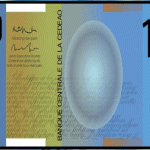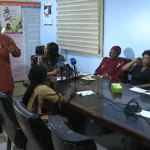The Centre for Food Safety and Agricultural Research (CEFSAR) has claimed that the ‘Tela maize’ a GMO crop, introduced and approved by the federal government in partnership with the National Biotechnology Development Agency (NABDA), was not engineered in Nigeria, contrary to official statements.
The Executive Director of CEFSAR, Prof. Qristtuberg Amua, made this assertion during a media symposium themed “Addressing Global and Local Concerns on Genetically Modified Foods.” He noted that this modified crop was rejected in Mexico and now Nigerians have been made to receive and intend to use it.
Collaborating partners at the meeting, including the Alliance for Action on Pesticide in Nigeria and Environmental Rights Action, amongst others have urged the federal government to provide evidence supporting the necessity and safety of GMOs in the country.
Additionally, Prof. Amua emphasised that CEFSAR’s mission is to ensure the safety of food for Nigerians and to draft policies that protect public health but the introduction of GMOs represents a significant exception to the organisation’s commitment to food safety.
The Centre for Food Safety and Agricultural Research (CEFSAR) has claimed that the ‘Tela maize’ a GMO crop, introduced and approved by the federal government in partnership with the National Biotechnology Development Agency (NABDA), was not engineered in Nigeria, contrary to official statements.
The Executive Director of CEFSAR, Prof. Qristtuberg Amua, made this assertion during a media symposium themed “Addressing Global and Local Concerns on Genetically Modified Foods.” He noted that this modified crop was rejected in Mexico and now Nigerians have been made to receive and intend to use it.
Collaborating partners at the meeting, including the Alliance for Action on Pesticide in Nigeria and Environmental Rights Action, amongst others have urged the federal government to provide evidence supporting the necessity and safety of GMOs in the country.
Additionally, Prof. Amua emphasised that CEFSAR’s mission is to ensure the safety of food for Nigerians and to draft policies that protect public health but the introduction of GMOs represents a significant exception to the organisation’s commitment to food safety.
The Centre for Food Safety and Agricultural Research (CEFSAR) has claimed that the ‘Tela maize’ a GMO crop, introduced and approved by the federal government in partnership with the National Biotechnology Development Agency (NABDA), was not engineered in Nigeria, contrary to official statements.
The Executive Director of CEFSAR, Prof. Qristtuberg Amua, made this assertion during a media symposium themed “Addressing Global and Local Concerns on Genetically Modified Foods.” He noted that this modified crop was rejected in Mexico and now Nigerians have been made to receive and intend to use it.
Collaborating partners at the meeting, including the Alliance for Action on Pesticide in Nigeria and Environmental Rights Action, amongst others have urged the federal government to provide evidence supporting the necessity and safety of GMOs in the country.
Additionally, Prof. Amua emphasised that CEFSAR’s mission is to ensure the safety of food for Nigerians and to draft policies that protect public health but the introduction of GMOs represents a significant exception to the organisation’s commitment to food safety.
The Centre for Food Safety and Agricultural Research (CEFSAR) has claimed that the ‘Tela maize’ a GMO crop, introduced and approved by the federal government in partnership with the National Biotechnology Development Agency (NABDA), was not engineered in Nigeria, contrary to official statements.
The Executive Director of CEFSAR, Prof. Qristtuberg Amua, made this assertion during a media symposium themed “Addressing Global and Local Concerns on Genetically Modified Foods.” He noted that this modified crop was rejected in Mexico and now Nigerians have been made to receive and intend to use it.
Collaborating partners at the meeting, including the Alliance for Action on Pesticide in Nigeria and Environmental Rights Action, amongst others have urged the federal government to provide evidence supporting the necessity and safety of GMOs in the country.
Additionally, Prof. Amua emphasised that CEFSAR’s mission is to ensure the safety of food for Nigerians and to draft policies that protect public health but the introduction of GMOs represents a significant exception to the organisation’s commitment to food safety.
The Centre for Food Safety and Agricultural Research (CEFSAR) has claimed that the ‘Tela maize’ a GMO crop, introduced and approved by the federal government in partnership with the National Biotechnology Development Agency (NABDA), was not engineered in Nigeria, contrary to official statements.
The Executive Director of CEFSAR, Prof. Qristtuberg Amua, made this assertion during a media symposium themed “Addressing Global and Local Concerns on Genetically Modified Foods.” He noted that this modified crop was rejected in Mexico and now Nigerians have been made to receive and intend to use it.
Collaborating partners at the meeting, including the Alliance for Action on Pesticide in Nigeria and Environmental Rights Action, amongst others have urged the federal government to provide evidence supporting the necessity and safety of GMOs in the country.
Additionally, Prof. Amua emphasised that CEFSAR’s mission is to ensure the safety of food for Nigerians and to draft policies that protect public health but the introduction of GMOs represents a significant exception to the organisation’s commitment to food safety.
The Centre for Food Safety and Agricultural Research (CEFSAR) has claimed that the ‘Tela maize’ a GMO crop, introduced and approved by the federal government in partnership with the National Biotechnology Development Agency (NABDA), was not engineered in Nigeria, contrary to official statements.
The Executive Director of CEFSAR, Prof. Qristtuberg Amua, made this assertion during a media symposium themed “Addressing Global and Local Concerns on Genetically Modified Foods.” He noted that this modified crop was rejected in Mexico and now Nigerians have been made to receive and intend to use it.
Collaborating partners at the meeting, including the Alliance for Action on Pesticide in Nigeria and Environmental Rights Action, amongst others have urged the federal government to provide evidence supporting the necessity and safety of GMOs in the country.
Additionally, Prof. Amua emphasised that CEFSAR’s mission is to ensure the safety of food for Nigerians and to draft policies that protect public health but the introduction of GMOs represents a significant exception to the organisation’s commitment to food safety.
The Centre for Food Safety and Agricultural Research (CEFSAR) has claimed that the ‘Tela maize’ a GMO crop, introduced and approved by the federal government in partnership with the National Biotechnology Development Agency (NABDA), was not engineered in Nigeria, contrary to official statements.
The Executive Director of CEFSAR, Prof. Qristtuberg Amua, made this assertion during a media symposium themed “Addressing Global and Local Concerns on Genetically Modified Foods.” He noted that this modified crop was rejected in Mexico and now Nigerians have been made to receive and intend to use it.
Collaborating partners at the meeting, including the Alliance for Action on Pesticide in Nigeria and Environmental Rights Action, amongst others have urged the federal government to provide evidence supporting the necessity and safety of GMOs in the country.
Additionally, Prof. Amua emphasised that CEFSAR’s mission is to ensure the safety of food for Nigerians and to draft policies that protect public health but the introduction of GMOs represents a significant exception to the organisation’s commitment to food safety.
The Centre for Food Safety and Agricultural Research (CEFSAR) has claimed that the ‘Tela maize’ a GMO crop, introduced and approved by the federal government in partnership with the National Biotechnology Development Agency (NABDA), was not engineered in Nigeria, contrary to official statements.
The Executive Director of CEFSAR, Prof. Qristtuberg Amua, made this assertion during a media symposium themed “Addressing Global and Local Concerns on Genetically Modified Foods.” He noted that this modified crop was rejected in Mexico and now Nigerians have been made to receive and intend to use it.
Collaborating partners at the meeting, including the Alliance for Action on Pesticide in Nigeria and Environmental Rights Action, amongst others have urged the federal government to provide evidence supporting the necessity and safety of GMOs in the country.
Additionally, Prof. Amua emphasised that CEFSAR’s mission is to ensure the safety of food for Nigerians and to draft policies that protect public health but the introduction of GMOs represents a significant exception to the organisation’s commitment to food safety.













